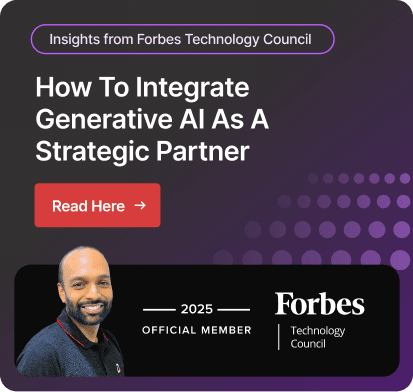AI for ERP: Enhance the Impact of ERP in your Business
Do you know there is a chance for you to have a better and more convenient manner to streamline your work with the existing software??
In this article, we will look at AI in ERP and why its introduction to the system would enhance the future of enterprise operations.
It has been observed that Enterprise Resource Planning (ERP) works as the backbone for larger organizations, helping them combine and computerize their business in different departments. But with the advancement in technology and introduction of Artificial Intelligence (AI), there has been a substantial change in the ERP system. The inculcation of AI in the ERP systems has the potential of revolutionizing business practices by enhancing automation, data analysis and overall business working.
It has been observed that ERP AI works as the backbone for larger organizations, helping them combine and computerize their business in different departments. But with the advancement in technology and the introduction of AI ERP systems, there has been a substantial change in the ERP landscape. The inculcation of AI in ERP systems has the potential to revolutionize business practices by enhancing automation, data analysis, and overall business efficiency.
What is ERP?
Enterprise Resource Planning, commonly known as ERP, is a kind of software that is used for organizing and managing the daily business activities like supply chain management, data analysis, risk management, maintaining the company books, and much more. The basic function of ERP is to combine all these different workings of all the departments and unify them into one system.
Additionally, they are used for making the workings seamless and efficient at the same time. The role of such a system, such as Microsoft ERP, is to handle huge amounts of data for better working, but with an increased amount of data for better working, but with an increased data flow, businesses need the best AI ERP solutions to ensure ease and efficiency in operations.
What is Artificial Intelligence?
Artificial Intelligence, or AI, is a common term these days. People are well aware of the growing use of AI in our day-to-day lives. To have a better understanding of what AI is, it is the stimulation of human intelligence done by machines. It is designed in a manner that makes processing huge data, making decisions, and understanding natural language simpler and faster.
AI for ERP is a mixture that is creating a system that would automate tasks while offering predictive analysis, advanced data insights, and enhancing the decision-making process.
How is AI contributing in ERP Systems?
Let’s have a closer look at how AI contributes in making ERP systems better and more efficient:
Automation becomes enhanced
AI and ERP go hand-in-hand. With AI’s help, ERP system can produce better and more enhanced results in comparison to traditional automation and working. With the help of AI algorithms, ERP software work better by predicting future outcomes, payroll processing, having the capability of correcting themselves, and much more.
Data analysis and predictive insights have been advanced
The biggest challenge a business faces is its capacity to understand the huge amount of data that they are required to collect. Here comes AI in play along with ERP systems; a particular part of AI, which is machine learning, is specifically designed for this purpose. Machine Learning is adept at understanding patterns, analyzing large amounts of data, and giving insights for the same. When this is combined into the ERP system, businesses will gain understandings that will lead to better decision-making.
Enhanced decision-making
When talking about data accumulation, ERP works like wonders, but then the understanding bit is left for humans to be dealt with. Herein, AI ERP plays a significant role as it brings in improved decision-making with its advanced analytics and recommendations. ERP AI has the capability of analyzing real-time data and making quick decisions.
Better Supply Chain Management
Supply chain management is one of the most crucial and confusing aspects of a business. AI in the ERP systems change that, as this artificial intelligence has the competence of analyzing data in real time, which makes analyzing the fluctuations and adjusting the strategies in a better and more efficient manner.
Personalizing the human experience
With the ERP software, it was often seen that the user did not have an option of personalizing the usage, which made it rather rigid. With AI incorporation, this issue can be curbed as it has the capacity of understanding patterns and tailoring the ERP interface as per personal liking. This entire tailoring makes the work easier, more convenient, and even more effective.
Top AI-Enabled ERP Systems
In this section, we will explore the top AI ERP system that includes AI to help you become more productive and efficient.
Microsoft Dynamics 365 Business Central
A system for all your needs, Dynamics 365 Business Central, is developed for small to medium-sized enterprises (SMBs). This software lets you deal with customer support, operations, sales, and finances all from one location.
Built-in AI (Copilot) helps you forecast disruptions, automate inventory control, identify and stop fraud in real-time, and create data-driven decisions. Dynamics AI is a very adaptive that enables you to simplify your company procedures and bolster its overall efficiency.
Key Features:
- Provides quick response and assistance by interacting with employees and consumers.
- Offers real-time financial insights and simplifies accounting processes.
- Improves sales procedures and client contacts.
- Monitors projects using comprehensive job costing and reporting tools.
Benefits:
- Improves productivity by working smoothly with Microsoft Office 365, Azure, and Power BI.
- Flexible deployment choices help it to fit expanding corporate needs.
- Familiar Microsoft environments lower the learning curve.
Drawbacks:
- Highly specialized industrial needs could call for more development.
- Extra users and modules can make it costly.
SAP S/4HANA
A competent ERP system built for big companies, SAP S/4HANA uses the SAP HANA in-memory database for real-time data processing. While providing industry-specific features, it simplifies processes across production, procurement, sales, and finance.
Its built-in artificial intelligence improves user experience, predictive analytics, and automation through natural language processing (NLP).
Also Read: SAP Alternative
Key Features:
- Offers quick insights into speedier decision-making.
- Covers purchasing, supply chain, manufacturing, sales, and finance.
- Provides pre-built features customized for several sectors.
Benefits:
- In-memory computing guarantees quicker data access and processing.
- Aids several operational and financial international rules.
- Made for companies with changing and complicated organizational structures.
Drawbacks:
- Installation calls for considerable time commitment and knowledge.
- Licensing, upkeep, and tailoring could be costly.
Oracle NetSuite
A cloud-based ERP system destined mostly for mid-sized companies, Oracle NetSuite offers a single platform to control supply chain operations, e-commerce, CRM, and financials. For expanding companies, it provides scalability and flexibility.
It improves financial closing procedures, optimizes inventory levels, and supports salespeople with smart recommendations using AI-driven automation.
Also Read: Oracle Alternative
Main Features:
- Automates billing, revenue recognition, and accounting.
- Improves client contacts and involvement.
- Effortlessly links financial and inventory systems to internet sales channels.
Benefits:
- Completely reachable from any location with an internet link.
- Changes with growing corporate complexity and expansion.
- Gives current analysis on operational and financial performance.
Drawbacks:
- For complicated business-specific changes, you need technical knowledge.
- Possible challenges connecting with non-Oracle third-party apps.
Infor CloudSuite
Tailored for sectors including manufacturing, healthcare, and distribution, Infor CloudSuite is a cloud-based ERP tool. It includes artificial intelligence features to automate tasks, improve operations, and strengthen predictive analytics.
Predictive modeling and NLP-driven reporting help Coleman AI, Infor's AI engine, to offer insights on inventory, maintenance, and customer interaction.
Key Features:
- Pre-configured workflows for several sectors.
- For great security and scalability, hosted on AWS.
- Provides forecasting tools and thorough operational knowledge.
Benefits:
- Automated processes driven by artificial intelligence simplify mundane chores.
- Cloud-based systems help companies grow.
- Predictive analysis helps to enhance strategic planning.
Drawbacks:
- Customizing choices lengthens the duration of implementation.
- Full use may call for significant employee training.
Epicor ERP
Aimed at mid-sized to big companies, especially in manufacturing, distribution, and retail, Epicor ERP It uses artificial intelligence to improve supply chain efficiency, decision-making, and forecasting.
It enables companies to simplify logistics and labor control by means of AI-driven demand forecasting and last-mile delivery optimization.
Key Features:
- Financial reporting, budgeting, and accounting management.
- Offers control and monitoring of production in real time.
- Improves logistical operations, purchasing, and inventory control.
Benefits:
- Flexible to different industry-specific requirements.
- Links several corporate functions to provide more visibility.
- Modular design helps future company expansion.
Drawbacks:
- Its many features call for user education to negotiate.
- Deployment can be IT knowledge and resources intensive.
- Certain sophisticated capabilities could cost more.
Benefits of AI for ERP Systems
Some of the benefits of AI that would improve the ERP system and make their working more effective:
Increase in Efficiency
Efficiency is increased when ERP with AI processes the data faster and in real-time, reducing the chances of errors and making significant growth.
Forecasting becomes better
Forecasting is done based on old as well as real-time data. With the help of AI, these forecasts can become better and more accurate in all aspects of business.
Cost is reduced
Bye AI has the working of human intelligence in a much faster and more efficient way, along with minimizing errors, it minimizes the operational cost that was required in the traditional ERP system.
Data security is enhanced
As discussed above, AI has the capability of understanding the patterns; hence, it also recognizes the unusual patterns and transaction activities, marking the risk potential in real-time, which enhances the overall business security.
Better scaling
With the traditional ERP system, the main issue was dealing with a huge amount of data. Growing businesses faced issues with the same; now with AI, large data can be operational without any issue, making the system effective and operational.
The Future of AI in ERP
It can be seen that ERP and AI and their integration are in the early stages, but the future seems bright. Artificial intelligence will be a blessing in disguise for big businesses. AI will help make the ERP systems more autonomous and more user-friendly.
AI-driven ERP software are likely to become better at handling unstructured data as machine learning advances, which will further improve their analytical skills. This suggests that businesses will be able to use information from a collection of sources, such as social media, and client reviews, to build a more thorough picture of their activities and the demands.
Dynamics Square: Your Partner in Implementing Advanced ERP Solutions
Dynamics Square is a leading Microsoft Dynamics Partner in Ontario that help businesses to tailor the best AI ERP solutions, Dynamics 365. We help you implement, migrate, or upgrade as per your requirements. Our team of experts also helps you utilize Microsoft Copilot that can help you enhance automation, improve data analysis, and improve overall efficiency.
Irrespective of your industry, you can reach our consultant to reduce your operational costs.
Call our expert now at +1 778 381 5388 and get the best out of your investment!
Conclusion
Artificial intelligence in ERP is not a figment of imagination; it is here and has the capacity to change the way businesses run. Systems that are more intelligent, effective, and better equipped to handle the demands of the fast-paced business world of today are being created through the marriage of artificial intelligence's (AI) sophisticated capabilities with ERP's organized frameworks.
ERP system will advance in cycle with AI, making a path for a time when companies will be able to reach extraordinary levels of automation, insight, as well as efficiency. Organizations should grasp the opportunity to execute AI-powered ERP systems to become ready for a future in which corporate plan and knowledge will be more closely intertwined than ever.



